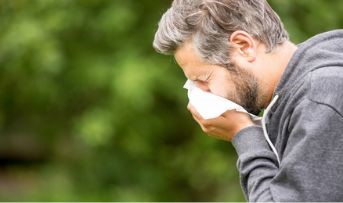Blog Details - Magma Insurance

Most common summertime allergies, their symptoms and treatment 27th March 2023
Summer is a time for fun and outdoor activities, but allergies can become a spoilsport for many people. Various allergens can thrive in higher temperatures and humidity levels, causing people to experience allergic reactions. Pollen, mould, insect stings, food, and sun allergies are among the most prevalent summer allergies. Sneezing, runny nose, and more severe reactions like anaphylaxis are just a few of the symptoms that these allergies can produce.
Here's something you must know for your relief. Buying a health insurance policy for family covers various medical costs, including those incurred because of allergies. Depending on the policy, doctor visits, prescription drugs, diagnostic tests, and hospitalisation may all be covered.
Here, we'll go into detail on the symptoms of the most prevalent summertime allergies. Understand these symptoms so that you can work out the remedies to prevent the situation from getting worse.
1. Mould allergies
Mould is a fungus that grows well in warm, moist places like restrooms, basements, and air conditioners. The summer months bring higher humidity levels, perfect for mould growth.
Inhaled mould spores have the potential to cause following allergic responses.
● Runny nose
● Itchy eyes
● Skin rashes
● Coughing
● Wheezing
Mould allergies occasionally result in respiratory issues or sinus infections that can disrupt your routine.
2. Sun allergies
Sun allergies are common during summer. The most common cause of sun allergies is an immunological response to the sun's ultraviolet (UV) radiation that results in an allergic reaction.
Sun allergy signs and symptoms include:
● Itching
● Swelling
● Burning sensation
● Redness, rash, hives, and blistering on the skin
● Headache
Sun allergies may occasionally result in fever and chills. Covered skin, a hat, an umbrella and sunscreen can be effective when heading out in the sun.
3. Pollen allergies
Hay fever and allergic rhinitis are additional names for allergies to pollen. During the reproductive process, plants release pollen. It can trigger an allergic reaction in certain people when inhaled. Symptoms can vary in severity depending on the individual and the type of pollen that causes the reaction.
Pollen allergies can cause these symptoms:
● Congestion
● Itchy and watery eyes
● Sneezing
● Fatigue
● Runny nose
● Throat irritation
● Headache
Pollen allergy episodes and breathing difficulties might occur in extreme situations. If
you are susceptible to pollen allergy, wear a mask when heading out.
4. Food allergies
Food allergies can occur during the summer, a season for picnics, barbecues, and outdoor dining.
Food allergies can cause these symptoms:
● Abdominal pain
● Diarrhoea
● Nausea and vomiting
● Anaphylaxis (a severe, life-threatening allergic reaction)
● Itching, swelling, and hives
● Difficulty breathing
Those with food allergies must remain cautious to prevent unintended exposure to allergens.
5. Insect sting allergies
Bug stings are common in summer months as Insects like bees, wasps, and hornets are more active.
Among the signs of an allergy to bug stings are:
● Dizziness
● Difficulty breathing
● Nausea and vomiting
● Diarrhoea
● Swelling, itching, redness, and pain around the sting area
● Hives
Preventing summertime allergies
You should take precautions to lower the risk of allergy reactions. Consider the following tactics:
● Verify the pollen count: Daily pollen counts for your location are available on many weather websites and apps. Before scheduling any outdoor activities, check the pollen count. Try to stay inside during periods of high pollen.
● Utilise air conditioning: The air conditioning in your house might help filter out allergies. Use a HEPA-filtered air conditioner to keep allergens out and close the windows and doors.
● Know what triggers you: Determining which allergens cause your symptoms is the first step in preventing summer allergies. This can apply to meals, pollen, mould, bug stings, etc. When you are aware of your triggers, you can take precautions to prevent them.
● Maintain a spotless home: The number of allergens in your home can be decreased with routine cleaning. Keep the carpets and upholstery clean, and wash your bedding and curtains frequently.
● Putting on protective clothes: Wear long sleeve shirts and slacks when you're outside to shield your skin from bug bites and sunburn. Pollen exposure can also be decreased by donning a hat and sunglasses.
For many people, having allergies in the summertime can be unpleasant. Sneezing and a runny nose are subtle symptoms. Anaphylaxis is a more severe symptom. It's essential to know your triggers, take precautions, and consider immunotherapy to prevent summertime allergies. Also, speaking with a healthcare professional about allergy prevention and treatment is essential. It is also crucial to have an appropriate health insurance policy for family. A comprehensive health insurance plan can help you and your loved ones stay protected from the financial adversities that may arise due to health emergencies.
Click HERE to buy a health insurance policy for family.
Disclaimer: The information provided above is for illustrative purposes only. To get more details, please refer to policy wordings and prospectus before purchasing a policy.
